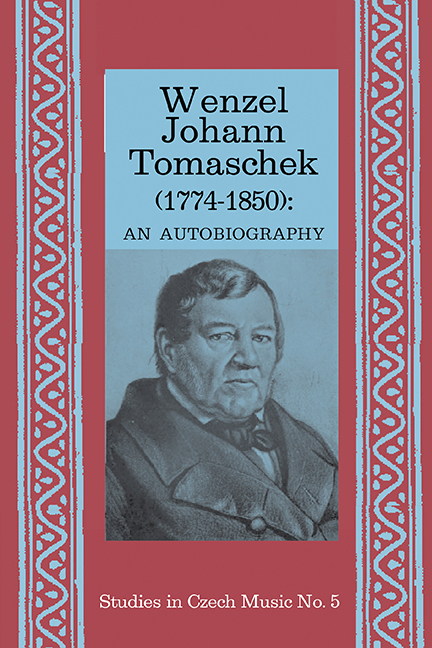Book contents
Chapter Ten
Summary
My departure from my brother and his wife was distressing for me this time, for I could not hope to see either again soon. I traveled together with a very pleasant merchant that I knew, and arrived in Prague with no problems. It was also high time for me to trade my boisterous life for a more tranquil existence and once more devote myself to art. The first that I produced was “Maria Stuart's Abschied von Frankreich und Klage aus dem Kerker”, a poetic bequest from this unhappy queen, for voice with piano accompaniment, op. 49, published in Prague by Enders. Next was op. 50: “Šestero Písni pro jeden hlas při Fortepiano” [Six Songs for One Voice with Fortepiano] with included German text, also published by Enders.
In 1815 I wrote: “Six Eglogues pour le Pianoforte, Livre IV., Oeuv. 51, which were published by Hofmeister in Leipzig.
Since piano technique had made almost unbelievable progress and every pianists swore allegiance to his own flag, and hoped to find in this way his future salvation, so it was not a surprise, that gymnastics became a branch of music
, and the one who managed to outdo the others in this regard, was considered the hero of the day (I say the day, because it was not certain whether there might not be another, coming from hill or dale, to rap him on the fingers, and put him out like a light). Anyone who was only able to tinkle the keys, produced nothing but finger exercises or so-called etudes, which certainly contained finger-carousels, but no music. The publishers bustled about considerably if they wanted to appear on the market with these at the right time.
These technical impulses caused me to think about whether it would not be possible to compose such pieces for piano, by which the young artist could achieve as fully developed a technique as possible, without the point of music thereby disappearing from view, and I had the notion to write “Tre Allegri capricciosi per il Pianoforte”, which Hofmeister in Leipzig took over as op. 52 for his publishing house. However, in order to draw all technically advanced pianists to the work, I added these few works to its title: “dedicated to perfect players”, and these few words caused these “Allegri” to be played quite often, as was my intention.
- Type
- Chapter
- Information
- Wenzel Johann Tomaschek (1774–1850)Autobiography, pp. 107 - 110Publisher: Boydell & BrewerPrint publication year: 2017



